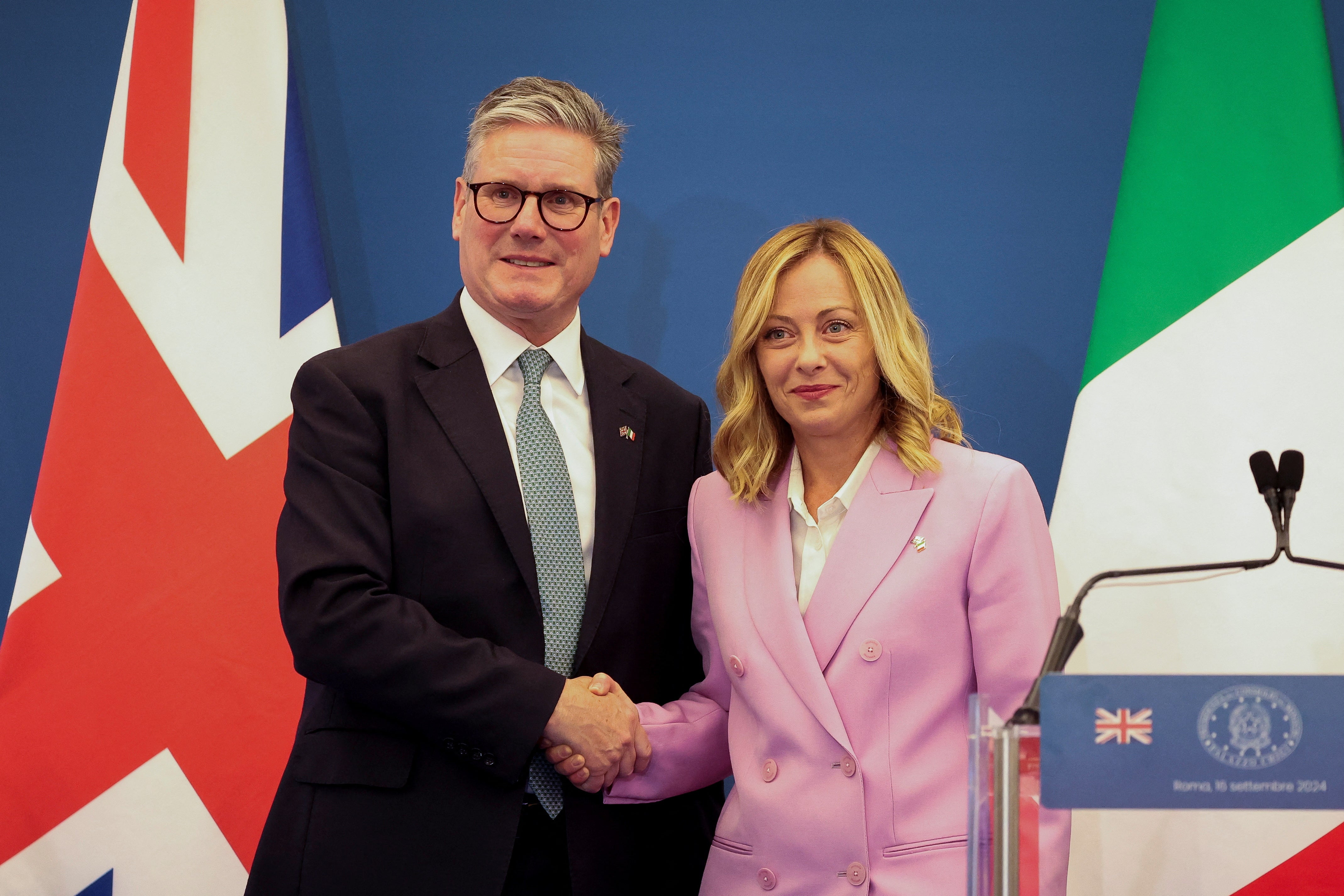On migration, Starmer and Meloni have found common ground
Editorial: The arrangement that permits Italy’s undocumented migrants to have their asylum claims processed in Albania is too easily dismissed as contracting out – and it would be foolish to think that Britain has nothing to learn from it

Pragmatism” is a word that Sir Keir Starmer uses a good deal when discussing migration. Indeed, so apparently proud is he of freeing himself and his party from the ideological shibboleths of the Corbyn era that he calls it “British pragmatism”. The concept summons up an image of the UK as a natural home for rational, evidence-based policy-making – which, to be fair, if that does come to pass, will make a highly refreshing change from recent history.
One of the strengths of Sir Keir’s unideological approach is that it means the British government can approach the world as it is, rather than how it might wish it to be.
Ideally, his visit to Italy would be to swap ideas with some like-minded fellow, a solid social democrat, a counterpart such as Olaf Scholz in Germany. Instead, Sir Keir is engaged in discussions with Giorgia Meloni about stopping the boats full of refugees seeking new lives in Europe.
Whatever her personal qualities, by background and outlook Ms Meloni, at least on paper, couldn’t be further away from the former human rights lawyer leading a Labour government. Since becoming premier at the head of a rightist coalition two years ago, Ms Meloni has become a bit of a pragmatist herself. She began her political career (she’s had no other experience) as the youth leader of a neo-fascist group.
Now, despite leading the Brothers of Italy, one of a number of far-right, Eurosceptic, populist parties that have hatched in recent years, she has developed a constructive relationship with the European Union and the president of its Commission, Ursula von der Leyen. Ms Meloni has kept her distance from the more truculent Marine Le Pen in France, and has proved one of the most outspoken supporters of Ukraine on the continent.
At any rate, she and Sir Keir have a common interest in reducing the flow of irregular migration across the Mediterranean, many of whom will have their sights firmly set on the even shorter journey across the English Channel. Having dumped the cruel, ruinously expensive and impractical Rwanda plan on day one, Sir Keir is now able to discuss rationally the processing – rather than the permanent deportation – of refugees in a third, safe country.
This is one of the solutions that Italy has pursued with Albania, with whom the UK also has an agreed returns policy. The important feature of the Italian system, sometimes too easily dismissed, is that it provides for genuine refugees, once their claims have been assessed, to take up residence in Italy – something not possible under the UK-Rwanda scheme.
Ms Meloni’s government has also actively worked with African countries “upstream” to ameliorate the conditions that drive migration, and funded and managed an overhaul of Tunisian and Libyan border control, stopping the boats with some effect. Millions are also being spent on large, purpose-built migrant detention centres. Taken together, they are helping Italy cope with its status as the current preferred landing ground for irregular migrants.
It is only fair to concede that Italy, Greece and Malta have had to deal with the bulk of the migrants arriving in Europe in this manner, with insufficient support from fellow EU members and the EU Commission. In that context, the modest but symbolic contribution of £4m the UK government is making towards what is called the Rome Process is very encouraging. Rishi Sunak struck up an unusually friendly rapport with Ms Meloni, and Sir Keir is building on the diplomatic trust that has been built up. That is as it should be.
In light of recent experience, it would be foolish to think that Britain has nothing to learn from Italy in this field, whatever the current political complexion of the Italian government.
Italy has made progress and, crucially, hasn’t felt it necessary to withdraw from the European Convention on Human Rights, a facile solution that has become so fashionable on the hard right of British politics. It is also a two-way process: the Royal Navy has been involved in operations in the Mediterranean with other European powers. The migration crisis is a global issue, and can only be dealt with successfully by nations working together.
The relationships Sir Keir is building up with key partners – France, Germany, Ireland, and now Italy – are crucial to that effort, and all the more essential now that the UK no longer takes part in the more intimate discussions within the European Union, having lost the influence it once had to steer member states to a more permanent “burden-sharing” arrangement.
But, again, the new Labour government has to work within the available post-Brexit channels, and has to seize the warm hand of friendship whenever it is proffered. It is good for Britain, but also for the refugees the British have a moral and legal obligation to assist.






Join our commenting forum
Join thought-provoking conversations, follow other Independent readers and see their replies
Comments